formerly eScholarship Editions


|
|
|
|
Your request for similar items found 20 book(s). | Modify Search | Displaying 1 - 20 of 20 book(s) | |
| 1. | 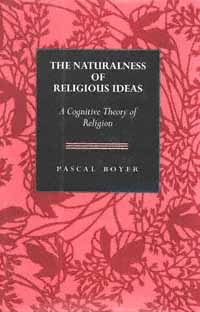 | Title: The naturalness of religious ideas: a cognitive theory of religion Author: Boyer, Pascal Published: University of California Press, 1994 Subjects: Anthropology | Philosophy | Psychology Publisher's Description: Why do people have religious ideas? And why those religious ideas? The main theme of Pascal Boyer's work is that important aspects of religious representations are constrained by universal properties of the human mind-brain. Experimental results from developmental psychology, he says, can explain why certain religious representations are more likely to be acquired, stored, and transmitted by human minds. Considering these universal constraints, Boyer proposes an exciting new answer to the question of why similar religious representations are found in so many different cultures. His work will be widely discussed by cultural anthropologists, psychologists, and students of religion, history, and philosophy. [brief] Similar Items |
| 2. | 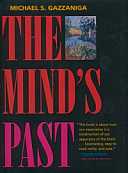 | Title: The mind's past Author: Gazzaniga, Michael S Published: University of California Press, 1998 Subjects: Science | Psychology | Cognitive Science | Neuroscience Publisher's Description: Why does the human brain insist on interpreting the world and constructing a narrative? In this ground-breaking work, Michael S. Gazzaniga, one of the world's foremost cognitive neuroscientists, shows how our mind and brain accomplish the amazing feat of constructing our past - a process clearly fraught with errors of perception, memory, and judgment. By showing that the specific systems built into our brain do their work automatically and largely outside of our conscious awareness, Gazzaniga calls into question our everyday notions of self and reality. The implications of his ideas reach deeply into the nature of perception and memory, the profundity of human instinct, and the ways we construct who we are and how we fit into the world around us.Over the past thirty years, the mind sciences have developed a picture not only of how our brains are built but also of what they were built to do. The emerging picture is wonderfully clear and pointed, underlining William James's notion that humans have far more instincts than other animals. Every baby is born with circuits that compute information enabling it to function in the physical world. Even what helps us to establish our understanding of social relations may have grown out of perceptual laws delivered to an infant's brain. Indeed, the ability to transmit culture - an act that is only part of the human repertoire - may stem from our many automatic and unique perceptual-motor processes that give rise to mental capacities such as belief and culture.Gazzaniga explains how the mind interprets data the brain has already processed, making "us" the last to know. He shows how what "we" see is frequently an illusion and not at all what our brain is perceiving. False memories become a part of our experience; autobiography is fiction. In exploring how the brain enables the mind, Gazzaniga points us toward one of the greatest mysteries of human evolution: how we become who we are. [brief] Similar Items |
| 3. |  | Title: Hellenistic philosophy of mind Author: Annas, Julia Published: University of California Press, 1994 Subjects: Classics | Social and Political Thought | Intellectual History | Classical Philosophy | Philosophy | Rhetoric Publisher's Description: Hellenistic Philosophy of Mind is an elegant survey of Stoic and Epicurean ideas about the soul - an introduction to two ancient schools whose belief in the soul's physicality offer compelling parallels to modern approaches in the philosophy of mind. Annas incorporates recent thinking on Hellenistic philosophy of mind so lucidly and authoritatively that specialists and nonspecialists alike will find her book rewarding.In part, the Hellenistic epoch was a "scientific" period that broke with tradition in ways that have an affinity with the modern shift from the seventeenth and eighteenth centuries to the present day. Hellenistic philosophy of the soul, Annas argues, is in fact a philosophy of mind, especially in the treatment of such topics as perception, thought, and action. [brief] Similar Items |
| 4. | 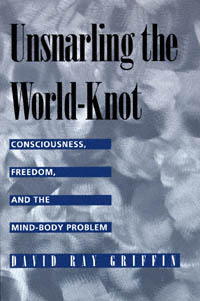 | Title: Unsnarling the world-knot: consciousness, freedom, and the mind-body problem Author: Griffin, David Ray 1939- Published: University of California Press, 1998 Subjects: Philosophy | Intellectual History Publisher's Description: The mind-body problem, which Schopenhauer called the "world-knot," has been a central problem for philosophy since the time of Descartes. Among realists - those who accept the reality of the physical world - the two dominant approaches have been dualism and materialism, but there is a growing consensus that, if we are ever to understand how mind and body are related, a radically new approach is required.David Ray Griffin develops a third form of realism, one that resolves the basic problem (common to dualism and materialism) of the continued acceptance of the Cartesian view of matter. In dialogue with various philosophers, including Dennett, Kim, McGinn, Nagel, Seager, Searle, and Strawson, Griffin shows that materialist physicalism is even more problematic than dualism. He proposes instead a pan-experientialist physicalism grounded in the process philosophy of Alfred North Whitehead. Answering those who have rejected "pan-psychism" as obviously absurd, Griffin argues compellingly that pan-experientialism, by taking experience and spontaneity as fully natural, can finally provide a naturalistic account of the emergence of consciousness - an account that also does justice to the freedom that we all presuppose in practice. [brief] Similar Items |
| 5. | 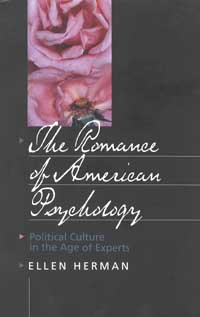 | Title: The romance of American psychology: political culture in the age of experts Author: Herman, Ellen Published: University of California Press, 1995 Subjects: Social Science | American Studies | Politics | Psychology | United States History Publisher's Description: Psychological insight is the creed of our time. A quiet academic discipline two generations ago, psychology has become a voice of great cultural authority, informing everything from family structure to government policy. How has this fledgling science become the source of contemporary America's most potent ideology?In this groundbreaking book - the first to fully explore the political and cultural significance of psychology in post-World War II America - Ellen Herman tells the story of Americans' love affair with the behavioral sciences. It began during wartime. The atmosphere of crisis sustained from the 1940s through the Cold War gave psychological "experts" an opportunity to prove their social theories and behavioral techniques. Psychologists, sociologists, and anthropologists carved a niche within government and began shaping military, foreign, and domestic policy. Herman examines this marriage of politics and psychology, which continued through the tumultuous 1960s.Psychological professionals' influence also spread among the general public. Drawn by promises of mental health and happiness, people turned to these experts for enlightenment. Their opinions validated postwar social movements from civil rights to feminism and became the basis of a new world view. Fascinating and long overdue, this book illuminates one of the dominant forces in American society. [brief] Similar Items |
| 6. | 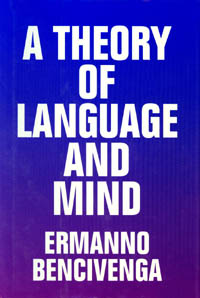 | Title: A theory of language and mind Author: Bencivenga, Ermanno 1950- Published: University of California Press, 1997 Subjects: Philosophy Publisher's Description: In his most recent book, Ermanno Bencivenga offers a stylistically and conceptually exciting investigation of the nature of language, mind, and personhood and the many ways the three connect. Bencivenga, one of the most iconoclastic voices to emerge in contemporary American philosophy, contests the basic assumptions of analytic (and also, to an extent, postmodern) approaches to these topics. His exploration leads through fascinating discussions of education, courage, pain, time and history, selfhood, subjectivity and objectivity, reality, facts, the empirical, power and transgression, silence, privacy and publicity, and play - all themes that are shown to be integral to our thinking about language. Relentessly bending the rules, Bencivenga frustrates our expectations of a "proper" theory of language. He invokes the transgressions of Nietzsche and Wittgenstein even as he appropriates the aphoristic style of Wittgenstein's Tractatus . Written in a philosophically playful and experimental mode, A Theory of Language and Mind draws the reader into a sense of continual surprise, therapeutic discomfort, and discovery. [brief] Similar Items |
| 7. | 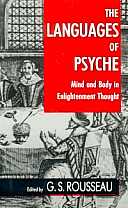 | Title: The Languages of psyche: mind and body in Enlightenment thought: Clark Library lectures, 1985-1986 Author: Rousseau, G. S. (George Sebastian) Published: University of California Press, 1991 Subjects: History | Medicine | History and Philosophy of Science | European History | European Literature Publisher's Description: The Languages of Psyche traces the dualism of mind and body during the "long eighteenth century," from the Restoration in England to the aftermath of the French Revolution. Ten outstanding scholars investigate the complex mind-body relationship in a variety of Enlightenment contexts - science, medicine, philosophy, literature, and everyday society. No other recent book provides such an in-depth, suggestive resource for philosophers, literary critics, intellectual and social historians, and all who are interested in Enlightenment studies. [brief] Similar Items |
| 8. | 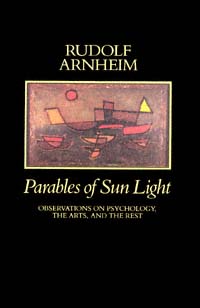 | Title: Parables of sun light: observations on psychology, the arts, and the rest Author: Arnheim, Rudolf Published: University of California Press, 1990 Subjects: Art | Art Theory Publisher's Description: For many years Rudolf Arnheim, known as the leading psychologist of art, has been keeping notebooks in which to jot down observations, ideas, questions, and even (after a stay in Japan for a year) poems in the haiku pattern. Some of these notes found their way into his books - known and prized the world over - such as Art and Visual Perception , Visual Thinking , and The Power of the Center (see list below). Now he has selected, from the remaining riches of his notebooks, the items in this volume. The book will be a joy to ramble through for all lovers of Arnheim's work, and indeed for anyone who shares Arnheim's contagious interest in the order that lies behind art, nature, and human life. It is a seedbed of ideas and observations in his special fields of psychology and the arts. "I have avoided mere images and I have avoided mere thoughts," says Arnheim in the Introduction, "but whenever an episode observed or a striking sentence read yielded a piece of insight I had not met before, I wrote it down and preserved it." There are also glimpses of his personal life - his wife, his cats, his students, his neighbors and colleagues. He is always concrete, in the manner that has become his trademark, often witty, and sometimes a bit wicked.In the blend of life and thought caught in these jottings, psychology and the arts are of course prominent. But philosophy, religion, and the natural sciences add to the medley of topics - always addressed in a way to sharpen the senses of the reader who, sharing Arnheim's cue from Dylan Thomas, may accompany him through "the parables of sun light and the legends of the green chapels and the twice told fields of childhood."All of Rudolf Arnheim's books have been published by the University of California Press. [brief] Similar Items |
| 9. | 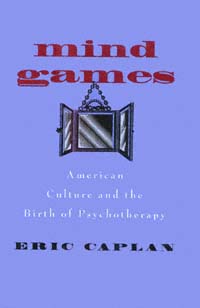 | Title: Mind games: American culture and the birth of psychotherapy Author: Caplan, Eric 1962- Published: University of California Press, 1998 Subjects: History | United States History | American Studies | Science | History and Philosophy of Science Publisher's Description: Eric Caplan's fascinating exploration of Victorian culture in the United States shatters the myth of Freud's seminal role in the creation of American psychotherapy. Resurrecting the long-buried "prehistory" of American mental therapeutics, Mind Games tells the remarkable story of how a widely assorted group of actors - none of them hailing from Vienna or from any other European city - compelled a reluctant medical profession to accept a new role for the mind in medicine. By the time Freud first set foot on American soil in 1909, as Caplan demonstrates, psychotherapy was already integrally woven into the fabric of American culture and medicine.What came to be known as psychotherapy emerged in the face of considerable opposition, much - indeed most - of which was generated by the medical profession itself. Caplan examines the contentious interplay within the American medical community, as well as between American physicians and their lay rivals, who included faith-healers, mind-curists, Christian Scientists, and Protestant ministers. These early practitioners of alternative medicine ultimately laid the groundwork for a distinctive and much heralded American type of psychotherapy. Its grudging acceptance by both medical elites and rank and file physicians signified their understanding that reliance on physical therapies to treat nervous and mental symptoms compromised their capacity to treat - and compete - effectively in a rapidly expanding mental-medical marketplace. Mind Games shows how psychotherapy came to occupy its central position in mainstream American culture. [brief] Similar Items |
| 10. |  | Title: Taming the wind of desire: psychology, medicine, and aesthetics in Malay shamanistic performance Author: Laderman, Carol Published: University of California Press, 1991 Subjects: Anthropology | Asian Studies | Medical Anthropology | Psychology | Southeast Asia | Medicine Publisher's Description: Charged with restoring harmony and relieving pain, the Malay shaman places his patients in trance and encourages them to express their talents, drives, personality traits - the "Inner Winds" of Malay medical lore - in a kind of performance. These healing ceremonies, formerly viewed by Western anthropologists as exotic curiosities, actually reveal complex multicultural origins and a unique indigenous medical tradition whose psychological content is remarkably relevant to contemporary Western concerns.Accepted as apprentice to a Malay shaman, Carol Laderman learned and recorded every aspect of the healing seance and found it comparable in many ways to the traditional dramas of Southeast Asia and of other cultures such as ancient Greece, Japan, and India. The Malay seance is a total performance, complete with audience, stage, props, plot, music, and dance. The players include the patient along with the shaman and his troupe. At the center of the drama are pivotal relationships - among people, between humans and spirits, and within the self. The best of the Malay shamans are superb poets, dramatists, and performers as well as effective healers of body and soul. [brief] Similar Items |
| 11. |  | Title: Strong mothers, weak wives: the search for gender equality Author: Johnson, Miriam M Published: University of California Press, 1988 Subjects: Sociology | Psychology | Women's Studies Publisher's Description: A leading theorist in the sociology of sex and gender, Miriam Johnson establishes as her starting point the belief that inequality is not inherent or inevitable in heterosexual relations. In Strong Mothers, Weak Wives she develops this notion by examining how gender differences get translated into g . . . [more] Similar Items |
| 12. |  | Title: Mental ills and bodily cures: psychiatric treatment in the first half of the twentieth century Author: Braslow, Joel T 1959- Published: University of California Press, 1997 Subjects: Science | Psychiatry | Medicine | History and Philosophy of Science | Psychology Publisher's Description: Mental Ills and Bodily Cures depicts a time when psychiatric medicine went to lengths we now find extreme and perhaps even brutal ways to heal the mind by treating the body. From a treasure trove of California psychiatric hospital records, including many verbatim transcripts of patient interviews, Joel Braslow masterfully reconstructs the world of mental patients and their doctors in the first half of the twentieth century. Hydrotherapy, sterilization, electroshock, lobotomy, and clitoridectomy - these were among the drastic somatic treatments used in these hospitals.By allowing the would-be healers and those in psychological and physical distress to speak for themselves, Braslow captures the intense and emotional interplay surrounding these therapies. His investigation combines revealing clinical detail with the immediacy of "being there" in the institutional setting while decisions are made, procedures undertaken, and results observed by all those involved. We learn how well-intentioned physicians could rationalize and regard as therapeutic treatments that often had dreadful consequences, and how much the social and cultural world is inscribed within the practice of biological psychiatry. The book will interest historians of medicine, practicing psychiatrists, and everyone who knows or has seen what it's like to be in mental distress. [brief] Similar Items |
| 13. | 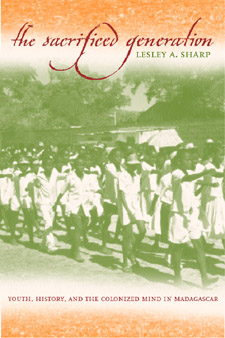 | Title: The sacrificed generation: youth, history, and the colonized mind in Madagascar Author: Sharp, Lesley Alexandra Published: University of California Press, 2002 Subjects: Anthropology | African History | Postcolonial Studies | Geography Publisher's Description: Youth and identity politics figure prominently in this provocative study of personal and collective memory in Madagascar. A deeply nuanced ethnography of historical consciousness, it challenges many cross-cultural investigations of youth, for its key actors are not adults but schoolchildren. Lesley Sharp refutes dominant assumptions that African children are the helpless victims of postcolonial crises, incapable of organized, sustained collective thought or action. She insists instead on the political agency of Malagasy youth who, as they decipher their current predicament, offer potent, historicized critiques of colonial violence, nationalist resistance, foreign mass media, and schoolyard survival. Sharp asserts that autobiography and national history are inextricably linked and therefore must be read in tandem, a process that exposes how political consciousness is forged in the classroom, within the home, and on the street in Madagascar. Keywords: Critical pedagogy [brief] Similar Items |
| 14. | 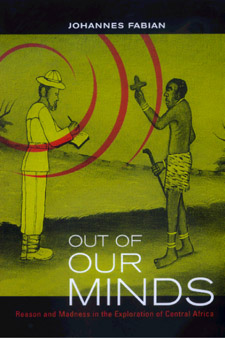 | Title: Out of our minds: reason and madness in the exploration of Central Africa: the Ad. E. Jensen lectures at the Frobenius Institut, University of Frankfurt Author: Fabian, Johannes Published: University of California Press, 2000 Subjects: Anthropology | African History | Cultural Anthropology Publisher's Description: Explorers and ethnographers in Africa during the period of colonial expansion are usually assumed to have been guided by rational aims such as the desire for scientific knowledge, fame, or financial gain. This book, the culmination of many years of research on nineteenth-century exploration in Central Africa, provides a new view of those early European explorers and their encounters with Africans. Out of Our Minds shows explorers were far from rational--often meeting their hosts in extraordinary states influenced by opiates, alcohol, sex, fever, fatigue, and violence. Johannes Fabian presents fascinating and little-known source material, and points to its implications for our understanding of the beginnings of modern colonization. At the same time, he makes an important contribution to current debates about the intellectual origins and nature of anthropological inquiry. Drawing on travel accounts--most of them Belgian and German--published between 1878 and the start of World War I, Fabian describes encounters between European travelers and the Africans they met. He argues that the loss of control experienced by these early travelers actually served to enhance cross-cultural understanding, allowing the foreigners to make sense of strange facts and customs. Fabian's provocative findings contribute to a critique of narrowly scientific or rationalistic visions of ethnography, illuminating the relationship between travel and intercultural understanding, as well as between imperialism and ethnographic knowledge. [brief] Similar Items |
| 15. | 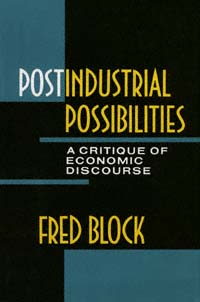 | Title: Postindustrial possibilities: a critique of economic discourse Author: Block, Fred L Published: University of California Press, 1990 Subjects: Labor Studies | Sociology | Labor Studies | Public Policy Publisher's Description: While it is often acknowledged that we live in a "postindustrial" age, our economic concepts have lagged far behind our postmodern sensibility. In this incisive new work, the well-known sociologist, Fred Block, sheds obsolete and shopworn economic analysis by presenting a bold, sweeping reconceptualization of the economy. Postindustrial Possibilities provides a fresh understanding of the dynamics of postindustrial change while offering a roadmap for future economic thinking.Block takes as his point of departure the tired concepts of neo-classical economics which, while still dominant, fall short as tools for comprehending contemporary economic forces. In Block's mind, the failure to revise the concepts of industrial economics means that the reality of today's economy is increasingly understood as "through a glass darkly." Intent on reinvigorating thinking in this area, Block masterfully critiques the central categories of neo-classical economics, such as the market, labor, and capital.Block argues that the neo-classical tradition has obscured the fact that capitalist prosperity has been built not on "free markets" but rather on systematic constraints on market freedom. He further suggests that measurements of capital have become increasingly problematic and that the concept obscures the critical sources of productivity within organizations. In his far-reaching analysis of the Gross National Product, Block shows that there is a growing divergence between the factors that determine people's well-being and trends in measured GNP. Postindustrial Possibilities sets forth a new intellectual paradigm that might be called "Qualitative Growth." One of its primary foci is a shift toward improved product quality and greater priority for various non-commodity satisfactions such as leisure, interesting work, economic security and a safe and clean environment. It also promotes a recognition that greater economic efficiency rests not on infusions of capital but on cooperative labor relations and on institutional reform.Wide-ranging, intellectually vibrant and lucid, Postindustrial Possibilities will engender controversy and debate. It is an enormous contribution that social scientists and policymakers will need to come to terms with. [brief] Similar Items |
| 16. | 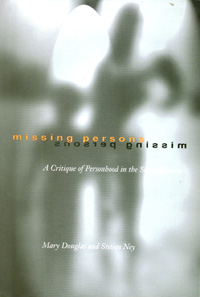 | Title: Missing persons: a critique of the social sciences Author: Douglas, Mary Published: University of California Press, 1998 Subjects: Sociology | Anthropology | Public Policy | Economics and Business Publisher's Description: The Western cultural consensus based on the ideas of free markets and individualism has led many social scientists to consider poverty as a personal experience, a deprivation of material things, and a failure of just distribution. Mary Douglas and Steven Ney find this dominant tradition of social thought about poverty and well-being to be full of contradictions. They argue that the root cause is the impoverished idea of the human person inherited through two centuries of intellectual history, and that two principles, the idea of the solipsist self and the idea of objectivity, cause most of the contradictions.Douglas and Ney state that Economic Man, from its semitechnical niche in eighteenth-century economic theory, has taken over the realms of psychology, consumption, public assistance, political science, and philosophy. They say that by distorting the statistical data presented for policy analysis, the ideas of the solipsist self and objectivity indeed often protect a political bias. The authors propose to correct this by revising the current model of the person. Taking cultural bias into account and giving full play to political dissent, they restore the "persons" who have been missing from the social science debates.Drawing from anthropology, economics, political science, and sociology, the authors set forth a fundamental critique of the social sciences. Their book will find a wide audience among social scientists and will also interest anyone engaged in current discussions of poverty.This book is a copublication with the Russell Sage Foundation. [brief] Similar Items |
| 17. |  | Title: Natural conflict resolution Author: Aureli, Filippo 1962- Published: University of California Press, 2000 Subjects: Science | Zoology | Psychology | Cultural Anthropology | Politics | Sociology Publisher's Description: Aggression and competition are customarily presented as the natural state of affairs in both human society and the animal kingdom. Yet, as this book shows, our species relies heavily on cooperation for survival as do many others - from wolves and dolphins to monkeys and apes. A distinguished group of fifty-two authors, including many of the world's leading experts on human and animal behavior, review evidence from multiple disciplines on natural conflict resolution, making the case that reconciliation and compromise are as much a part of our heritage as is waging war. Chimpanzees kiss and embrace after a fight. Children will appeal to fairness when fighting over a toy. Spotted hyenas, usually thought to be a particularly aggressive species, use reconciliation to restore damaged relationships. As these studies show, there are sound evolutionary reasons for these peacekeeping tendencies. This book also addresses the cultural, ecological, cognitive, emotional, and moral perspectives of conflict resolution. [brief] Similar Items |
| 18. | 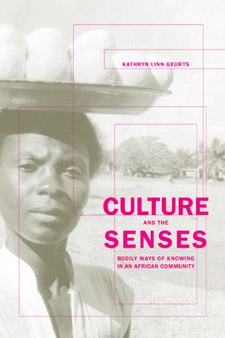 | Title: Culture and the senses: bodily ways of knowing in an African community Author: Geurts, Kathryn Linn 1960- Published: University of California Press, 2003 Subjects: Cultural Anthropology | African Studies | Ethnic Studies Publisher's Description: Adding her stimulating and finely framed ethnography to recent work in the anthropology of the senses, Kathryn Geurts investigates the cultural meaning system and resulting sensorium of Anlo-Ewe-speaking people in southeastern Ghana. Geurts discovered that the five-senses model has little relevance in Anlo culture, where balance is a sense, and balancing (in a physical and psychological sense as well as in literal and metaphorical ways) is an essential component of what it means to be human. Much of perception falls into an Anlo category of seselelame (literally feel-feel-at-flesh-inside), in which what might be considered sensory input, including the Western sixth-sense notion of "intuition," comes from bodily feeling and the interior milieu. The kind of mind-body dichotomy that pervades Western European-Anglo American cultural traditions and philosophical thought is absent. Geurts relates how Anlo society privileges and elaborates what we would call kinesthesia, which most Americans would not even identify as a sense. After this nuanced exploration of an Anlo-Ewe theory of inner states and their way of delineating external experience, readers will never again take for granted the "naturalness" of sight, touch, taste, hearing, and smell. [brief] Similar Items |
| 19. | 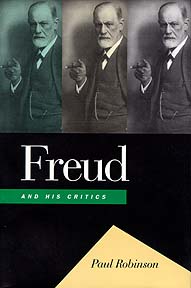 | Title: Freud and his critics Author: Robinson, Paul A 1940- Published: University of California Press, 1993 Subjects: History | Intellectual History | Autobiographies and Biographies | Psychology | Psychiatry Publisher's Description: Wars against Freud have been waged along virtually every front during the past decade. Now Paul Robinson takes on three of Freud's most formidable critics, mounting a thoughtful, witty, and ultimately devastating critique of the historian of science Frank Sulloway, the psychoanalyst Jeffrey Masson, and the philosopher Adolf Grünbaum.Frank Sulloway contends that Freud took most of his ideas from Darwin and other contemporary thinkers - that he was something of a closet biologist. Jeffrey Masson charges that Freud caved in to peer pressure when he abandoned his early seduction theory (which Masson believes was correct) in favor of the theory of infantile sexuality. Adolf Grünbaum impugns Freud's claim to have grounded his ideas - especially the idea of the unconscious - on solid empirical foundations.Under Robinson's rigorous cross-examination, the evidence of these three accusers proves ambiguous and their arguments biased by underlying assumptions and ideological commitments. Robinson concludes that the anti-Freudian writings of Sulloway, Masson, and Grünbaum reveal more about their authors' prejudices - and about the Zeitgeist of the past decade - than they do about Freud.Beautifully crafted and full of surprises, Robinson's work is a compelling defense of one of history's most original and powerful minds. Freud and His Critics will earn an enduring place in the raging Freudian debate. [brief] Similar Items |
| 20. | 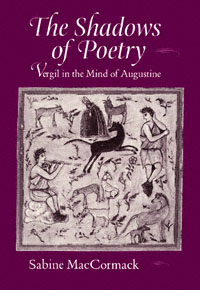 | Title: The shadows of poetry: Vergil in the mind of Augustine Author: MacCormack, Sabine Published: University of California Press, 1998 Subjects: Classics | Classical Literature and Language | Ancient History | Christianity | Poetry Publisher's Description: Imperial ceremony was a vital form of self-expression for late antique society. Sabine MacCormack examines the ceremonies of imperial arrivals, funerals, and coronations from the late third to the late sixth centuries A.D., as manifest in the official literature and art of the time. Her study offers . . . [more] Similar Items |